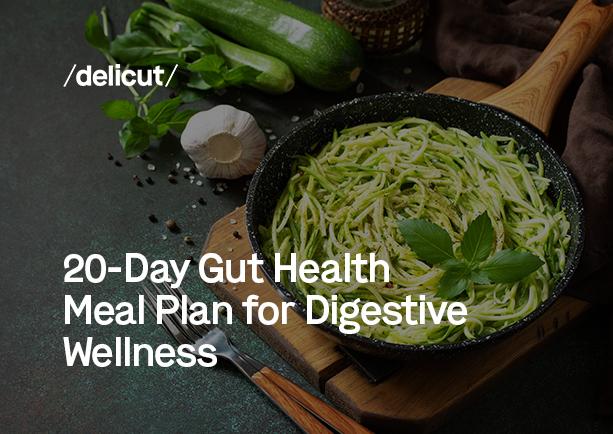20-Day Gut Health Meal Plan for Digestive Wellness

Achieving optimal digestive wellness begins with what you put on your plate. A well-balanced gut health meal plan can transform your digestion, boost your immune system, and enhance your overall well-being. This 20-day meal plan nourishes your gut with the right combination of probiotics, prebiotics, fibre, and anti-inflammatory foods.
Join us on this journey to a healthier gut and a happier you. We'll dive into delicious and nutritious meals that support your digestive health and keep you feeling your best every day. Let's embark on this path to better digestion and vibrant health together!
What is Gut Health?
The digestive system is home to trillions of bacteria, viruses, and fungi, collectively known as the gut microbiota. These microorganisms help break down food, produce essential nutrients, and protect against harmful pathogens. A balanced gut microbiome supports a healthy diet by efficiently processing food and absorbing nutrients.
What Can Affect Your Gut Health?
- Several factors can affect gut health, including diet, lifestyle, and stress. A fibre-rich diet, probiotics, and prebiotics can promote a healthy gut.
- Foods like yogurt, kefir, sauerkraut, and kimchi are excellent sources of probiotics, which are beneficial bacteria that support gut health.
- Prebiotics in foods like oats, bananas, and garlic serve as food for these beneficial bacteria, helping them thrive.
How to Maintain Gut Health?
- Regular exercise, adequate sleep, and stress management are important for a healthy gut. Chronic stress can disrupt the balance of gut bacteria, leading to digestive issues and weakened immunity.
- Hydration is another key aspect of gut health. Drinking plenty of water helps to keep the digestive system functioning smoothly and supports the health of the gut lining. Staying hydrated aids in the digestion of food and the absorption of nutrients.
- Gut health is also linked to mental health. The gut-brain connection means that a healthy gut can positively impact mood, and cognitive function, contributing to mental well-being by promoting a healthy gut-brain axis.
20-Day Gut Health Meal Plan Breakdown
Creating a meal plan focusing on gut health might seem daunting, but a structured 20-day plan can be both manageable and enjoyable. The key is to incorporate foods that support a healthy gut microbiome, promote good digestion, and make you feel your best. Let's break down this 20-day gut health meal plan to help you on your journey to digestive wellness.
Week 1: Introduction to Gut-Healthy Foods
- Breakfast: Start your day with overnight oats. Simply soak oats in almond milk overnight and top with berries and chia seeds in the morning. This meal is rich in fibre and antioxidants, which are great for your gut.
- Lunch: A quinoa salad packed with mixed vegetables and chickpeas. Quinoa is a complete protein, and chickpeas are an excellent source of fiber.
- Dinner: Grilled salmon paired with a side of steamed broccoli. Salmon provides healthy omega-3 fats, and broccoli is a fantastic source of fibre and vitamins.
- Snacks: For probiotics, eat yogurt with a drizzle of honey and a handful of carrot sticks with hummus for a fibre-rich treat.
Day 2:
- Breakfast: A smoothie made with kefir, banana, and a handful of spinach. Kefir is packed with probiotics, bananas provide potassium, and spinach is rich in iron.
- Lunch: A turkey and avocado wrap on a whole-grain tortilla. This wrap is not only delicious but also provides healthy fats and fiber.
- Dinner: Stir-fried tofu with colourful bell peppers served over brown rice. Tofu offers a good source of protein, and bell peppers add a variety of vitamins and antioxidants.
- Snacks: Apple slices paired with almond butter for a satisfying and nutritious snack, and a small handful of nuts for extra protein and healthy fats.
Repeat this structure for the rest of the week, ensuring you incorporate gut-friendly foods.
Week 2: Enhancing Digestive Wellness
As we move into the second week, we'll focus on adding more variety to our meals to ensure we get a broad spectrum of nutrients supporting gut health.
- Breakfast: Greek yogurt topped with honey and mixed nuts. This combination offers probiotics, protein, and healthy fats.
- Lunch: A hearty lentil soup with a side of mixed greens. Lentils are a great source of fibre and plant-based protein.
- Dinner: Baked chicken served with roasted sweet potatoes. Sweet potatoes are high in fiber and vitamins, which support digestive health.
- Snacks: Kefir smoothie for a probiotic boost and cucumber slices with hummus for a crunchy, fiber-rich snack.
Keep this varied structure throughout the week, experimenting with different vegetables, proteins, and grains.
Week 3: Probiotics and Prebiotics
This week, boost your intake of probiotics and prebiotics, essential for maintaining a healthy gut microbiome.
- Breakfast: Overnight oats made with kefir and topped with fresh blueberries. Kefir provides probiotics, and blueberries are rich in antioxidants.
- Lunch: A grilled veggie panini on whole grain bread. Grilled vegetables add a smoky flavour and lots of fibre.
- Dinner: Zucchini noodles tossed with pesto and topped with grilled chicken. Zucchini noodles are a low-carb alternative to pasta, and pesto adds a burst of flavour.
- Snacks: For an extra dose of probiotics, sip on kombucha and enjoy a sweet and nutritious mixed fruit salad.
Follow this pattern for the rest of the week, incorporating different probiotic foods like sauerkraut, kimchi, and fermented vegetables.
Week 4: Maintaining and Adapting
In the final week, we focus on maintaining these healthy habits and adapting the plan to ensure long-term sustainability.
- Breakfast: A smoothie bowl made with spinach, banana, and yogurt. This nutrient-packed breakfast is a great way to start your day.
- Lunch: A chickpea salad sandwich on whole grain bread. Chickpeas are a fantastic source of fibre and protein.
- Dinner: A salmon and quinoa bowl with roasted vegetables is a balanced, nutritious, and delicious.
- Snacks: Greek yogurt sprinkled with flax seeds for a fiber boost and celery sticks with peanut butter for a satisfying snack.
Continue with this approach, mixing and matching your favorite gut-friendly foods to keep things interesting and enjoyable.
What are the Tips for Success?
- Meal Prep Tips: Plan and prepare your meals in advance to save time and ensure you always have healthy options. Keep various ingredients in your pantry and fridge to make meal prep easier.
- Hydration: Drinking plenty of water is crucial for digestion and overall health. Aim to drink at least 8 glasses of water a day.
- Lifestyle Tips: Regular physical activity and stress management techniques such as meditation or yoga can further support your digestive health.
In Conclusion
Following a gut health meal plan doesn't have to be complicated or restrictive. You can significantly improve your digestive wellness by incorporating a variety of nutrient-rich foods, focusing on probiotics and prebiotics, and maintaining a balanced diet. This 20-day gut health meal plan is designed to introduce you to a wide array of delicious and gut-friendly foods, making it easier to stick to healthy eating habits long-term.
FAQs
1. How can a gut health meal plan improve digestive wellness?
A gut health meal plan provides essential nutrients that support a balanced microbiome and smooth digestion. It can also reduce inflammation and promote regular bowel movements. Plus, it can boost your overall energy and well-being!
2. What common digestive issues can a gut health meal plan help with?
A gut health meal plan can help with bloating, constipation, and diarrhoea. It can also alleviate symptoms of IBS and acid reflux. Eating the right foods can make a big difference in how you feel.
3. How does diet impact gut health?
Your diet directly affects the balance of good and bad bacteria in your gut. Eating fibre-rich and fermented foods promotes healthy bacteria, while processed foods can harm your gut. So, what you eat matters!
4. What foods should I include in a gut health meal plan?
Include plenty of fibre-rich foods like fruits, vegetables, and whole grains. Fermented foods like yogurt, kefir, and sauerkraut are also great. Don't forget lean proteins and healthy fats to round out your meals.
5. How can fermented foods benefit gut health?
Fermented foods are packed with probiotics, beneficial bacteria supporting gut health. They can improve digestion, boost your immune system, and help maintain a healthy gut microbiome. Adding them to your diet is a tasty way to promote wellness!
Trending Searches:
Meal Plan Dubai | Affordable Meal Plans Abu Dhabi | Meal Plan Ajman | Meal Plan Al In | Meal Plan Sharjah | Meal Plan Subscription
Read More:
30-Day High-Protein Meal Plan for Effective Weight Loss
20-Day Meal Plan for Heart Health: Strengthen Your Heart
20-Day Meal Plan for Improved Digestion: Enhance Your Gut Health
15-Day Vegan Meal Plan for New Mothers: Nourishing Recipes and Tips
10-Day Anti-Inflammatory Meal Plan for Seniors: Recipes and Benefits
Related Blogs
The Burnout Diet
Jan 30, 2026 | 8The mental load of “What should I eat today?"
Jan 22, 2026 | 8The real glow-up starts with your gut health
Jan 14, 2026 | 8Healthy food that doesn’t taste like “Diet Food”
Jan 17, 2026 | 8Why do most people in the UAE get their calories wrong
Dec 8, 2025 | 6DASH Diet Meal Plan
Nov 11, 2025 | 8Fatty Liver Meal Plan
Oct 31, 2025 | 8Pregnancy Diet Meal Plan
Oct 27, 2025 | 82000 Calorie Meal Plan
Oct 1, 2025 | 8Intermittent Fasting Diet Plan
Sep 5, 2025 | 8






